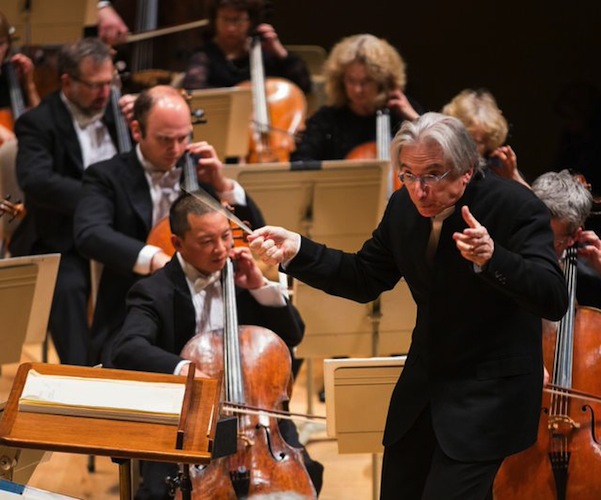Concert Review: Michael Tilson Thomas and the San Francisco Symphony Orchestra at Symphony Hall
Under Michael Tilson Thomas’s leadership, the San Francisco Symphony Orchestra’s sound has been refined and tightened; its repertoire has grown to embrace American music of all stripes.

Conductor Michael Tilson Thomas leading the San Francisco Symphony at Symphony Hall. Photo: Robert Torres.
By Jonathan Blumhofer
The tally is short, indeed, of conductors who have led a major orchestra for two decades or more. Even shorter is the list of such pairings that, after twenty years together, perform with more inquisitiveness, excitement, and electricity than when they started out. At the head of such a directory, though, must stand the San Francisco Symphony (SFS) and music director Michael Tilson Thomas, who this year commemorate their platinum anniversary.
Under Thomas’s leadership, the SFS’s sound has been refined and tightened; its repertoire has grown to embrace American music of all stripes; and it has delved into music education perhaps more profoundly and efficiently than any orchestra since Leonard Bernstein led the New York Philharmonic’s Young People’s Concerts fifty years ago. On Sunday afternoon, Thomas and the SFS came to Symphony Hall, courtesy of the Celebrity Series, with a varied, colorful program that is a hallmark of their partnership. A new piece by Samuel Carl Adams (son of John) was framed by music by Prokofiev and Ravel. Liszt’s Mephisto Waltz no. 1 led things off.
The most intriguing selection of the afternoon belonged to the local premiere of Adams’s Drift and Providence. A twenty-minute meditation “about the ocean” for orchestra and (very subtle) live electronics, Drift and Providence draws upon a range of influences and moves easily between different types of music. Despite a tendency to start and stop (especially towards the beginning) for little apparent expressive reason and the over-long presence of a recurring, static percussive sonority (the basis, apparently, of the understated electronic element), it’s a score that does many things right.
There’s rich, idiomatic writing for brass, including lots of trombone glissandos. Adams seems to have picked up his father’s penchant (lifted from Richard Strauss, among others) of scoring for unison winds and those sections never failed to tell gloriously. He has a good sense of narrative pacing and drama. Drift and Providence’s ending is wonderfully Ivesian: a quizzical flourish that just stops, mid-phrase. The SFS’s playing of it all was warm and evocative.
As the son of one of the most distinctive contemporary composers on the scene, Adams also ought to be commended for so early on finding his own voice. There was only one extended passage (in “Drift II”) that to these ears recalled sections of John Adams’s Naïve and Sentimental Music, but it fit seamlessly with the surrounding content. Not yet thirty, this Adams is one to watch, and on his own merits.
Before the Adams came Prokofiev’s Violin Concerto no. 2 with Gil Shaham as the soloist. Shaham has a sweeter, lighter tone than some violinists, but used that fact to his advantage in Sunday’s performance, which at times sounded almost like a concerto for violin and chamber ensemble.
His reading, in the first two movements, was marked by an inward focus and concentrated expression. The finale was packed with motoric energy. As seems to always be the case, Shaham’s oft-beaming face exuded not just a great enthusiasm for the work at hand but also a palpable joy in simply performing.
In the concerto, Thomas led an accompaniment that was a model of elasticity, fully partnering with Shaham and emphasizing the score’s darker shades. The SFS’s playing in the slow movement was often iridescent. And the finale brought forth some earthy, boot-stomping fervor.
Liszt’s Mephisto Waltz no. 1 also called for (and received) some rustic energy. Most familiar in its arrangement for solo piano, the original orchestral version doesn’t turn up in concert with much frequency. Sunday’s performance was light on its feet, but might have been more Mephistophelean: it never really crackled with menacing verve. What most stood out in the SFS’s reading was Liszt’s forward-looking orchestration, especially the delicate dovetailing of timbres across the wide orchestral palate.
It takes a certain amount of chutzpah for a visiting orchestra to bring anything by Ravel to Symphony Hall, so closely is the Boston Symphony Orchestra (BSO) identified with this Gallic composer and his output. But Thomas, who cut his teeth as an assistant conductor of the BSO in the ‘70s, apparently knows a thing or two about conducting Ravel in Symphony Hall and the complete simpatico between orchestra and music director was nowhere more evident than in the last “official” piece on the program, the Suite no. 2 from Daphnis and Chloe.
Sunday’s reading was fully up to the BSO’s exacting standard and often exceeded the bar: this was a performance of thrilling intensity and lustrous color. The opening sunrise scene was incandescent. Principal flute Tim Day delivered a sensuous account of the famous solo in the middle section. And the “Danse general” built to a ferocious, animalistic climax in which, it seemed, every moving part was balanced and audible.
For an encore, conductor and orchestra offered something quite different: Grieg’s The Last Spring. Bountifully lyrical and, in lesser hands, shamelessly sentimental, the SFS strings played it on Sunday with a direct emotional honesty and simplicity that, for about five minutes, all but froze time.
Jonathan Blumhofer is a composer and violist who has been active in the greater Boston area since 2004. His music has received numerous awards and been performed by various ensembles, including the American Composers Orchestra, Kiev Philharmonic, Camerata Chicago, Xanthos Ensemble, and Juventas New Music Group. Since receiving his doctorate from Boston University in 2010, Jon has taught at Clark University, Worcester Polytechnic Institute, and online for the University of Phoenix, in addition to writing music criticism for the Worcester Telegram & Gazette.
